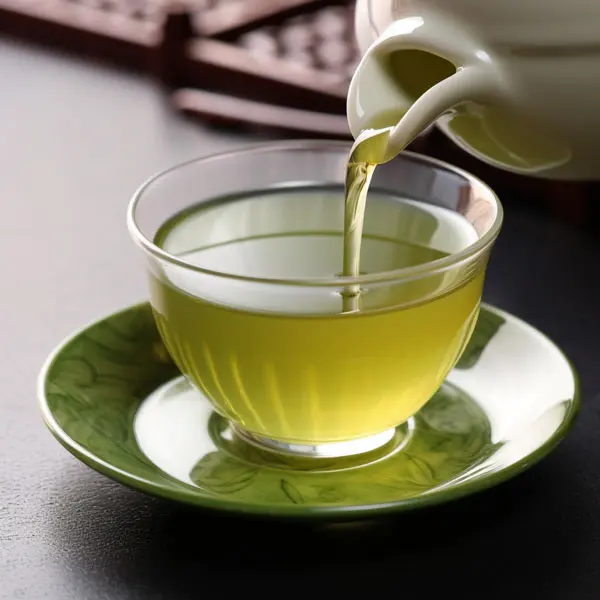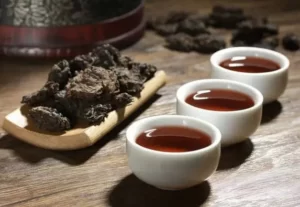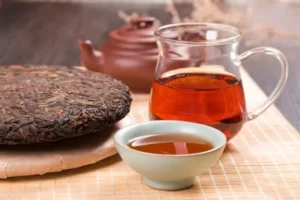In the previous article, I discussed the 10 benefits of Pu-erh tea. Undoubtedly, Pu-erh tea is a healthy and safe beverage, especially for those aiming to lower cholesterol and manage weight, making it suitable for daily consumption. However, like many caffeinated beverages, excessive intake may lead to some unnecessary side effects. Here, I will highlight some Pu erh tea side effects from overconsumption and provide solutions.
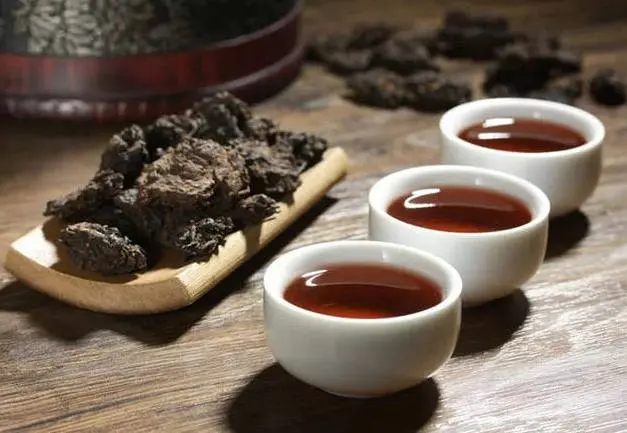
Understanding the Potential Side Effects of Pu-erh Tea
Pu-erh tea, when consumed in moderation (about 4 cups per day), is generally safe for most people. However, excessive intake can lead to side effects, most of which stem from the caffeine content in Pu-erh tea.
How Much Caffeine is in Pu-erh Tea?
Compared with other teas, Pu erh tea is relatively high in caffeine. Scientific data indicates that each cup of Pu-erh tea may contain 30-100 mg of caffeine, with fermented tea(ripe pu-erh) having higher caffeine levels than unfermented tea(raw pu-erh). Additionally, caffeine levels depend on brewing strength, with gongfu style brewing potentially yielding more caffeine.
But don’t worry, a cup of Pu-erh tea still contains far less caffeine than a cup of coffee.
Pu Erh Tea Side Effects and Solutions
Research suggests that most adults can tolerate up to 400 mg of caffeine per day (approximately 6 cups of tea, equals 4 cups of coffee). Exceeding this recommended amount may result in a range of side effects, from mild to severe, so let’s see what happens:
- insomnia
- headaches
- nervousness
- diarrhea
- irregular heartbeat
- ringing in the ears
- heartburn
- brown spots on teeth
- rarefaction of bone
Now let me go into more detail about the symptoms and how to relieve them.
1. Feeling Dizzy and Palpitations after Drinking Pu-erh Tea
This may be due to individual constitution or the tea being brewed too strongly. Since Pu-erh tea can cause a rapid decrease in blood sugar levels, individuals with low blood sugar or low blood pressure may experience symptoms such as dizziness and nausea after consuming Pu-erh tea. If these are the reasons, it’s recommended to either drink it in moderation or switch to floral teas.
Additionally, drinking tea stimulates gastrointestinal motility, leading to rapid food emptying and causing transient low blood sugar. To address this, simply avoid drinking tea on an empty stomach and consider pairing it with a small dessert.
2. Diarrhea after Drinking Pu-erh Tea
The fermentation process of Pu-erh tea can impact gut bacteria levels, potentially causing digestive issues like diarrhea. Some individuals may experience this when trying Pu-erh tea for the first time, a natural adjustment for the body to a new substance. It’s advisable to begin with a lower concentration when drinking Pu-erh tea to facilitate a smoother adaptation process.
3. Excessive Consumption Leading to Calcium Loss
While the polyphenols in Pu-erh tea can protect teeth, excessive consumption may have a detrimental effect. Tooth spots and osteoporosis can both be caused by calcium loss. This is because Pu-erh tea has a higher fluoride content, and when combined with calcium ions in water, it forms calcium fluoride, which is less easily absorbed by the body and is excreted through urine. Therefore, my suggestion is to avoid continuous excessive consumption of Pu-erh tea and occasionally switch to other types of tea.

Tea Recommendations for Specific Groups
For specific populations, Pu-erh tea consumption should be done under medical advice.
For patients on medication: Tannins and caffeine in Pu-erh tea may interact with certain drugs. For instance, co-ingesting with anticoagulants may increase bleeding risk. One study found that patients taking warfarin experienced bleeding after ingesting large amounts of tea. Therefore, patients should consult their doctor before drinking Pu erh tea.
The following are the Interactions of some other drugs that you need to pay attention to:
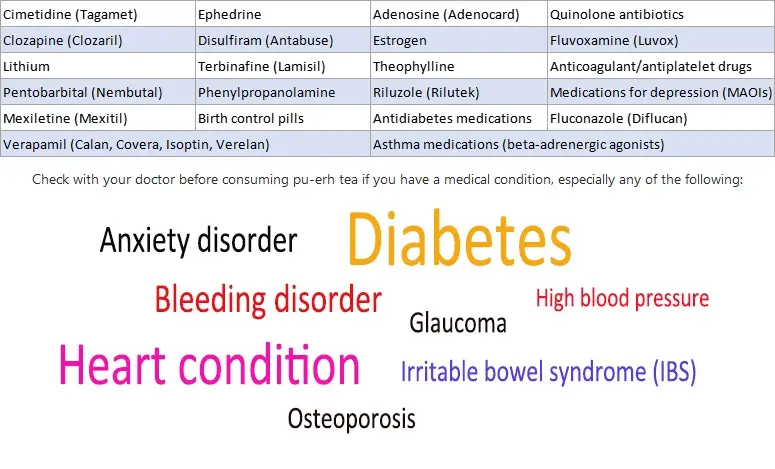
For pregnant women: Generally, daily caffeine intake below 200 mg is considered safe for pregnant women, equivalent to 3 cups of Pu-erh tea. However, excessive intake may be associated with issues like premature birth and low birth weight. Pregnant women should determine appropriate amounts under medical guidance.
For children: Children metabolize caffeine more slowly, and excess intake may lead to excitement and insomnia. Parents are advised to control children’s intake, ensuring they consume an appropriate amount of Pu-erh tea.
For insomniacs: Due to Pu-erh tea’s stimulating effects, it’s recommended for insomniacs to avoid drinking it before bedtime. Additionally, brewing time should be kept short (not exceeding 2 minutes), and the amount of tea leaves should be controlled to below 2 tablespoons.
Pu-erh Tea Alternatives
I recommend enjoying Pu-erh tea in the morning or afternoon. If concerns about caffeine persist, there are numerous caffeine-free alternatives to pu erh tea available. Herbal teas such as peppermint and rosemary are natural caffeine-free choices, offering benefits like digestive relief and immune enhancement. Personally, I would opt for a taste-alike, like rooibos tea. Although it may lack the richness of Pu-erh tea, it is caffeine-free and can aid in sleep when consumed before bedtime. Additionally, caffeine-free floral teas like chamomile are healthy substitutes.

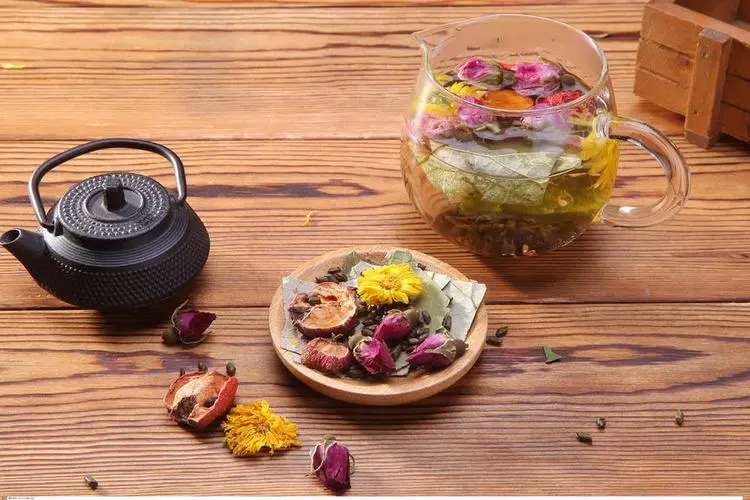
Final Thought
In conclusion, the health benefits of Pu-erh tea outweigh its side effects, and there’s no need for excessive concern. For healthy individuals, consuming up to 4 cups daily poses no harm, but understanding the principles of moderate consumption is crucial. Everyone’s tolerance to caffeine differs, so pay attention to your body’s signals while drinking tea. Specific populations should drink Pu-erh tea under medical advice, and opting for caffeine-free tea varieties is a wise health choice, allowing you to enjoy the health benefits of tea without caffeine.
FAQ
Q1: Is Pu-erh tea related to blood sugar control?
A: Yes, some studies suggest Pu-erh tea may be beneficial for blood sugar control. The polyphenols and antioxidants in tea are believed to improve insulin sensitivity, but more research is needed to determine specific effects in diabetic patients.
Q2: How does Pu-erh tea affect cardiovascular health?
A: The tea polyphenols and caffeine in Pu-erh tea may help lower cholesterol levels, positively impacting cardiovascular health. However, excessive caffeine intake may cause transient blood pressure elevation, so individuals with hypertension should moderate their consumption.
Q3: Is Pu-erh tea suitable for long-term consumption?
A: Moderate, long-term consumption of Pu-erh tea is generally safe and associated with many health benefits. However, excessive consumption may lead to caffeine-related issues. It is advisable to limit daily intake to around 4 cups.
